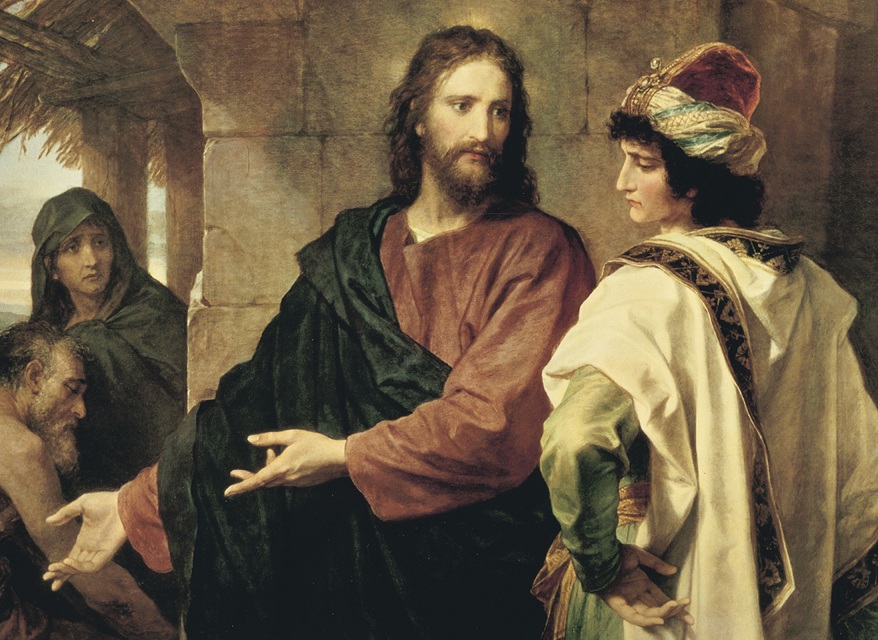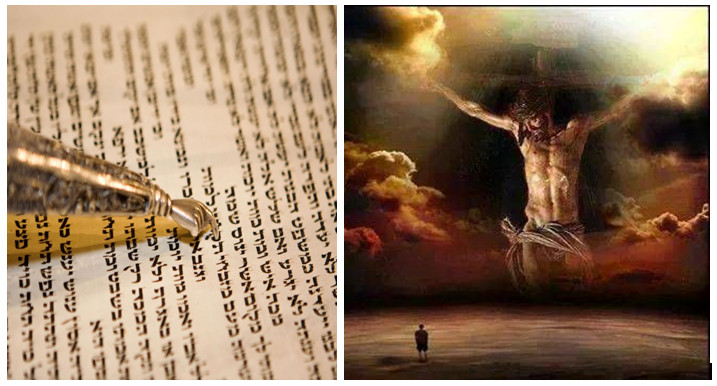|
This excerpt, more than any other point in the Gospel, clearly indicates
the birth of the Church, how the theology of the Incarnation is born, as
well as its consequences. Christ is trying to guide the young man, from
Jew to Christian. That is, to move from the Law, through to Grace. 'Good
teacher, what good thing should I do, to have eternal life?'
Here we are dealing with a typically Jewish question. The entirety of
Jewish wisdom has remained fixed on this point; even nowadays, if one
goes to a Jewish community, one will notice this form of spirituality of
“I give you - you give me”. The Jew has a very practical understanding
of spiritual life: “All I have to do is to observe the commandments in
order to ‘purchase’ eternal life, and nothing else. This mentality is a
peculiar kind of legalism that hinges on the Law and the prophets. God
is not present in the world, given that for Judaism, the Incarnation did
not take place, hence only His Law is present. God never became man, He
never came into this world, and therefore, only the Law exists in the
place of God.
This is where the entire difference between Jewish mentality and
Christian theology is found. Unfortunately, in practice these two are
often confused, because many Christians often have a Jewish-leaning
perception, as if the Incarnation did not take place. If the theory of
“merits” (which the Roman Catholic church espouses) is void, then what
counts is what I do - what I do must bear fruit in the faith that I have
in Christ. And my faith must be proven in this manner otherwise, I too
will come to accept the “merits of the saints” theory: “I deserve
merits, because I am just, and I lend to others. The meaning of
meritocracy is a legalistic one here, although it does contain a sense
of giving. In Judaism, giving is precluded. Given that the Incarnation
is denied, there is no personal relationship with God. The Christian
however is inside His house, he is an adopted child of God, he is a
brother of Christ, therefore God is by Grace also his father. The Holy
Spirit is present. That is why he works miracles and is sanctified.
A relationship through Law is a relationship between someone who gives
and someone else who also gives. God gives this much, so man gives as much;
man gives this much, so God gives as much. The relationship through Grace is
a relationship of excess. One may give more than the Law, and yet he receives
through Grace far more than he could ever imagine. THAT is the
difference.

“What good thing should I do?” The young man cannot perceive the
Incarnation; he does not realize Who is standing before him -.surely Jesus is
just a teacher of the Law? Thus, Christ tells him, “if you want to enter
the life of God, observe the commandments”... which seems to imply that
God is exempt and does not enter history - that He only gives
commandments.
Quite often, we Christians use the word commandments and some people
imagine we are referring to the Mosaic Law. But our commandments are
found in Christ’s Sermon on the Mount. Entirely new things were spoken
there,
which go far beyond the Jewish law, and the things described
therein are such that the Jewish
mentality cannot fathom unless it changed. The Jew has the mentality of
give-and-take - a noble mentality, but still, reminiscent of deal-making: If I do
something good, I will have a blessing in my life: fields, wealth, good
children, etc. Am I lacking all these things? Then something is wrong.
Christ therefore tells the young man to observe the commandments - the ones he
is familiar with - do not steal, do not kill, do not commit adultery,
etc. But the young man persists. He senses that there is something more
here.
This teacher definitely knows something more. The young man has a
cultivated spirit, because he is honest, he does indeed observe
everything that he claimed. And yet, he adds: “What am I lacking?”
This question is no longer very Jewish. He has begun to be receptive of
Christ’s revelation; he has become attracted to His personality; he has
seen the miracles that He had performed. He now wonders "Why do I, who observe the
commandments, cannot do what He does? What does He have, more than me?"
Christ's answer crushes Judaism, it completely crushes the legalistic
relationship.
If you want to become perfect, you shall do what I do, you shall give it
your all. I love you infinitely and you will love Me infinitely. THAT is
the incarnation: it is man’s infinite love for God, Who was incarnated
in the person of the maiden Virgin Mary - and the infinite love of God
for His creation, with His Incarnation in response to the Virgin Mary’s
infinite love for Him - that is, with His birth as a human being. This
is a great mystery!
Christianity is a new dimension
altogether; it is a madness. As a human being, Christ gives everything
to the Father. The human will is submitted to the Divine Will; as a
human being, He is completely open to the Will of God - an obedience
that does not lead to earthly glory but to earthly defeat; it leads to
the Cross. We are unable to comprehend this, and we do not comprehend
it, even though we are within the Church and are baptized. And although
we ask God to do something that we want, the joke is that He does it.
But only to a certain point, because He wants us to likewise make a leap
of faith from that point onward... to show Him that we look upon Him,
not only for His giving hands, but that we also look Him in the eyes.
Translation by A. N.
Greek Text |

